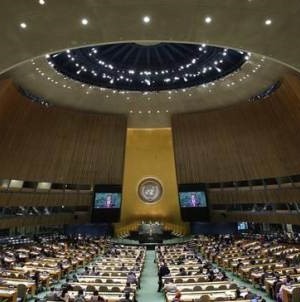- Finding Unshakable Power in a World That Wants to Pull Us ApartPosted 6 months ago
- What could a Donald Trump presidency mean for abortion rights?Posted 6 months ago
- Financial Empowerment: The Game-Changer for Women in Relationships and BeyondPosted 7 months ago
- Mental Health and Wellbeing Tips During and After PregnancyPosted 7 months ago
- Fall Renewal: Step outside your Comfort Zone & Experience Vibrant ChangePosted 7 months ago
- Women Entrepreneurs Need Support SystemsPosted 7 months ago
Campaign launches to elect first female U.N. Secretary-General

Author: Lisa Anderson Thomson Reuters Foundation at trust.org
Chinese Foreign Minister Wang Yi addresses the 69th United Nations General Assembly at the U.N. headquarters in New York September 27, 2014. REUTERS/Eduardo Munoz
Since its founding 70 years ago, the United Nations has been led by men, a tradition that some women’s rights advocates are determined to break when the global body elects a new secretary-general next year.
Equality Now, an international organisation that campaigns for the rights of women and girls, launched an online campaign across social media on Wednesday to promote female candidates to lead the U.N. after current Secretary-General Ban Ki-moon steps down at the end of 2016.
The campaign aims primarily at U.N. ambassadors from China, France, Russia, the United Kingdom and the United States, the five permanent members of the U.N. Security Council, who traditionally select a single candidate for ratification by a majority vote of the 193 member states.
“The selection process for the next UN Secretary-General is a great opportunity to bring us a step closer to gender equality globally,” Antonia Kirkland, legal advisor at Equality Now, said in a statement. “We are hopeful that there is more momentum now to make this a realistic possibility.”
She also raised questions about the secretive process by which permanent members of the Security Council decide on a candidate, an issue of growing concern to a number of member states and non-governmental organisations (NGOs).
“It is also vital we ensure that a transparent and fair nominations process and procedure exists, so that women can be seriously considered and are given an equal opportunity,” said Kirkland.
The U.N. Charter offers virtually no guidance on how a secretary-general should be selected, including no actual description of the job or list of qualifications for candidates.
The post tends to rotate among regions and in that system Eastern Europe would be the next to provide a secretary-general.
Countries may nominate candidates, but the Security Council makes the final decision behind closed doors without publishing any list of the contenders during the process or engaging in any discussion with member states.
A coalition of NGOs, including Equality Now, is asking for a more open and inclusive selection process through an online campaign called “1 for 7 billion: Find the best UN leader.”
The group is planning a social media “storm” on social media platforms Twitter, Facebook and Tumblr on April 27, when the U.N. General Assembly is scheduled to debate the rules governing the selection process for the next secretary-general.
The Equality Now campaign doesn’t endorse any candidates but simply provides a long list of prominent women diplomats and heads of state to illustrate the size and quality of the pool of possible female candidates.
According to U.N. diplomats, possible female candidates are New Zealander Helen Clark, chief of the U.N. Development Programme, President Dalia Grybauskaite of Lithuania, Bulgarians Kristalina Georgieva, European Commissioner for Budget and Human Resources, and Irina Bokova, head of the U.N. Educational, Scientific and Cultural Organization (UNESCO).
(Reporting by Lisa Anderson, Editing by Maria Caspani)






